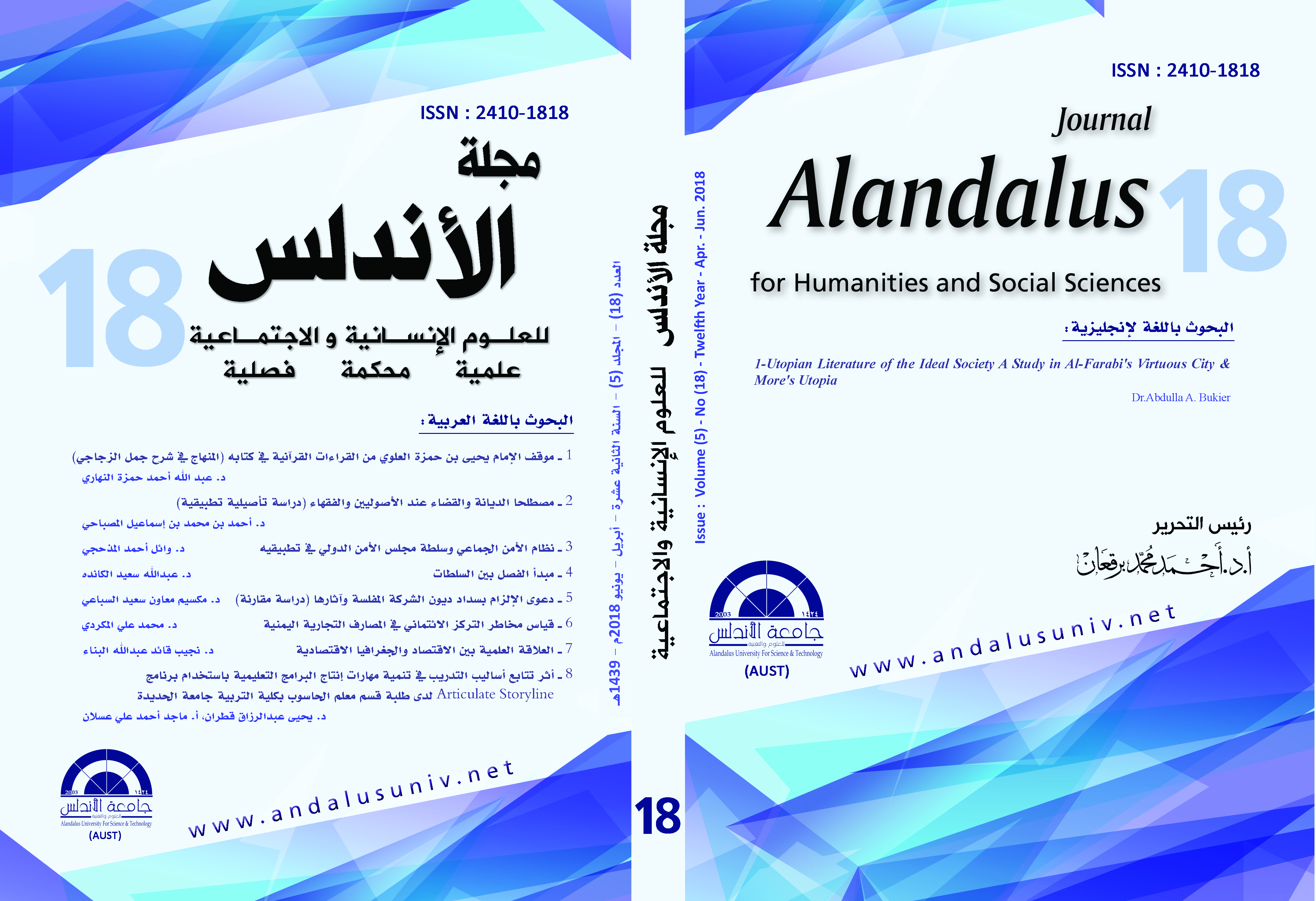The position of Imam Yahya bin Hamza Al - Alawi of the Koranic readings in his book curriculum in the explanation of glass sentences 10.35781/1637-000-018-001د. عبدالله النهاري
Main Article Content
Abstract
This research sought to shed light on the position of Imam Yahya ibn Hamzah al-Alawi on the Qur'anic reciting: In the book of al-Mannahj in the commentary of Jamal al-al-Zujaji. This book contains a large number of these Quranic reciting that serve the purpose of this study, and that: Uncovering his position with regard to his approach in terms of his ratio and dealing with it, and how he cited it and guided it, then his attitude towards the recitations on which the grammarian differed and their positions differed.
-He has studied his position on it according to the following plan:
- Introduction to the topic: revealed its importance, defense, and objectives.
- Dividing the subject into two chapters: first to study his methodology, citing it and how to direct it.
The second is to study his position on reciting in which grammarians differed and where their positions were divided by sects and individuals.
- Conclusion: The most important results of the research, we are indicating to the most prominent of which are as follows:
1- Al-Alawi's approach in his attribution of reciting revealed to us that his interest in them was focused on the witness in them and then he omitted more than half of the reciting we counted for him, but on the one hand he meant to indicate the type of reciting, even if he did not support them. Hence he repeats the phrases: the seven (Al-sabaa), the famous seven (Al-Sabaa Al-Mashhura), or the negative “read in other than the seven” (Maqrua fi Gair Sabaa) and the like — a lot. This position confirmed his belief in the popularity and frequency of these seven reciting and his appreciation to the authors. This position is different from that of many grammarians who did not acknowledge its frequency and challenged its narrators.
2- The research revealed that Al-Alawi cited all these reciting in most of the chapters and issues of the book, and invoked them and triumphed through them for the opinions he used to go to and choose. The research has confirmed that in this position he follows the view of those who are late, such as Ibn Maalik, Abu Hayyan, Ibn Hisham and others.
3- The researcher explained that Al-Alawi's position on reciting was not limited to citing them or protesting (Ihtejaj), but also directed a large number of them with a detailed and precise direction. He even expanded on some of them, citing the grammar disagreement in the matter of grammar, whenever one of the possible aspects of the reciting he directs.
4- The research also revealed to us that it was based on a number of criteria, the most important of which are: the meaning, context, and purpose of the verse. He, therefore, weighed two faces and saw others on these grounds, and his position was rarely taken up by pure grammar guidance.
5 — As it has been clear to us from his guidance and what he used to refer to in these recitations, or there is a disagreement between the grammarian on one of those causes — That his doctrine is based mainly on looking, weighing and choosing, not on following up and imitating, so sometimes he takes the opinion of Sibuh and his companions, and sometimes he disagrees with them. In another, he takes the rebukes of the late peers and their conditions in the matter that is disputed by the disagreement between the earlier peers, etc.
6- The research revealed that Al-Alawi used to fail in some of his directions so that he did not agree with them. That is very little compared to what was agreed upon. It is, perhaps, that he surpassed others in terms of accuracy and compromise. Perfection is confined to God.
7. The research, through the reciting on which the controversy arose, confirmed that his attitude towards them was mostly based on invoking the correct, well-known and clear analogy. Then after that, he either takes over it, or he rules on it for violating it without rebuttal or rejection, or he recounts what was said in it and does not comment on it either negatively or positively. This may be understood as being taken away from it and disagreed, and it may be understood to the contrary, or it may weaken it, but it does not overdo that. This means that his original position is to accept it without challenging it or those who read it.
8. With regard to al-Alawi, the research revealed that the Kufis, like the Basaries, were not less likely to challenge these reciting, but rather to them in that regard are equal, through what we have seen the position of Alfarra in most of those reciting. The sheikhs of the third century Hijri, the Basaries, and their disciples, such as the Mazini, Al-Mubarrad, and Al-zujaj, are among the most challenging grammarians of the recitations.
9. The research revealed that some of the latecomers might have outdone those who were early in the challenge, as they went not to accept their frequency. This position was based on it — according to what we have seen from their challenge — on the recognition that the matter has taken by diligence (Ijtehad) and consideration, not by reversion (Al-Rewayat), frequency and isnad. Hence, we have seen those of them who propose to some of these seven reciters, aspects of his reciting: if he had read them, he would have been better.
This abstract translated by Dar AlMandumah Inc 2018.

